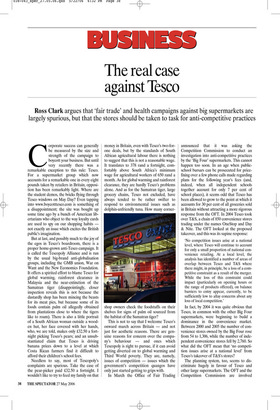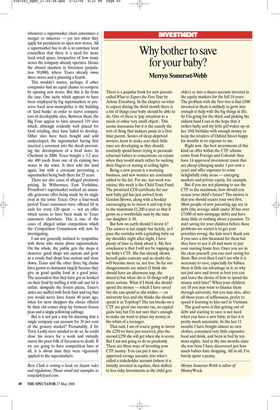The real case
against Tesco Ross Clark argues that ‘fair trade’ and health campaigns against big supermarkets are largely spurious, but that the stores should be taken to task for anti-competitive practices Corporate success can generally be measured by the size and strength of the campaign to boycott your business. But until very recently there was a remarkable exception to this rule: Tesco. For a supermarket group which now accounts for a remarkable one in every eight pounds taken by retailers in Britain, opposition has been remarkably light. Where are the student demos, the bricks flying through Tesco windows on May Day? Even tapping into www.boycotttesco.com is something of a disappointment; the site was bought up some time ago by a bunch of American libertarians who object to the way loyalty cards are used to spy on our shopping habits not exactly an issue which excites the British public’s imagination.
But at last, and possibly much to the joy of the egos in Tesco’s boardroom, there is a proper home-grown anti-Tesco campaign. It is called the Tescopoly Alliance and is run by the usual big-brand anti-globalisation groups, including the GMB union, War on Want and the New Economics Foundation. It offers a spirited effort to blame Tesco for global warming, rainforest clearance in Malaysia and the near-extinction of the Sumatran tiger (disappointingly, closer inspection reveals this is not because the dastardly shop has been mincing the beasts for its meat pies, but because some of its foods contain palm oil allegedly obtained from plantations close to where the tigers like to roam). There is also a little portrait of a South African woman outside a wooden hut, her face covered with her hands, who, we are told, makes only £32.50 a fortnight picking Tesco’s pears; and an unsubstantiated claim that Tesco is driving banana prices down to a level at which Costa Rican farmers find it difficult to afford their children’s school fees.
Needless to say, most of Tescopoly’s complaints are spurious. Take the case of the pear-picker paid £32.50 a fortnight. I wouldn’t like to try to feed my family on that money in Britain, even with Tesco’s two-forone deals, but by the standards of South African agricultural labour there is nothing to suggest that this is not a reasonable wage. It translates to 378 rand a fortnight, comfortably above South Africa’s minimum wage for agricultural workers of 650 rand a month. As for global warming and rainforest clearance, they are hardly Tesco’s problems alone. And as for the Sumatran tiger, large grocery chains, Tesco not excluded, have always tended to be rather swifter to respond to environmental issues such as dolphin-unfriendly tuna. How many corner shop owners check the foodstuffs on their shelves for signs of palm oil sourced from the habitat of the Sumatran tiger?
This is not to say that I welcome Tesco’s onward march across Britain — and not just for aesthetic reasons. There are genuine reasons for concern over the company’s behaviour — and ones which Tescopoly is right to pursue, if it can avoid getting diverted on to global warming and Third World poverty. They are, namely, issues of competition — issues which the government’s competition quangos have only just started getting to grips with.
In March the Office of Fair Trading announced that it was asking the Competition Commission to conduct an investigation into anti-competitive practices by the ‘Big Four’ supermarkets. This cannot happen too soon. In an age when publicschool bursars can be prosecuted for pricefixing over a few phone calls made regarding plans for the following year’s fees (and, indeed, when all independent schools together account for only 7 per cent of school places), it seems odd that Tesco has been allowed to grow to the point at which it accounts for 30 per cent of all groceries sold in Britain without attracting a more rigorous response from the OFT. In 2004 Tesco took over T&S, a chain of 850 convenience stores trading under the names OneStop and Day & Nite. The OFT looked at the proposed takeover, and this was its supine response: ‘No competition issues arise at a national level, where Tesco will continue to account for only a small proportion of national convenience retailing. At a local level, the analysis has identified a number of areas of overlap between Tesco and T&S where there might, in principle, be a loss of a competitive constraint as a result of the merger. While the loss of this constraint could impact (particularly on opening hours or the range of products offered), on balance barriers to entry appear, currently, to be sufficiently low to allay concerns about any loss of local competition.’ In fact, by 2004 it was quite obvious that Tesco, in common with the other Big Four supermarkets, were beginning to build a dominance in the convenience market. Between 2000 and 2005 the number of convenience stores owned by the Big Four rose from 54 to 1,306, while the number of independent convenience stores fell by 2,760. So what did the OFT mean that ‘no competition issues arise at a national level’ from Tesco’s takeover of T&S’s stores?
The planning system, too, seems to discriminate hugely in favour of Tesco and other large supermarkets. The OFT and the Competition Commission are involved whenever a supermarket chain announces a merger or takeover — yet not when they apply for permission to open new stores. All a supermarket has to do is to convince local councillors that there is a need for more local retail space, irrespective of how many stores the company already operates. Hence the absurd situation in Inverness (population 50,000), where Tesco already owns three stores and is planning a fourth.
This wouldn’t matter, perhaps, if other companies had an equal chance to compete by opening new stores. But this is far from the case. One tactic which appears to have been employed by big supermarkets to preserve local near-monopolies is the building of ‘land banks’ in order to starve competitors of developable sites. Between them, the Big Four appear to have amassed 319 sites which, although evidently well placed for food retailing, they have failed to develop. Other sites have been bought and sold undeveloped, the supermarket having first inserted a covenant into the deeds preventing the development of a food store. In Cheshunt in 2000, Tesco bought a 3.2 acre site 400 yards from one of its existing two stores in the town. It then sold the land again, but with a covenant preventing a supermarket being built there for 25 years.
There are also cases of alleged predatory pricing. In Withernsea, East Yorkshire, Proudfoot’s supermarket noticed an unusually generous offer being made by its single rival in the town: Tesco. Over a four-week period Tesco customers were offered £8 in cash for every £20 spent — not an offer which seems to have been made to Tesco customers elsewhere. This is one of the cases of alleged unfair competition which the Competition Commission will now be investigating.
I am not generally inclined to sympathise with those who moan about supermarkets. On the whole, the public gets the shops it deserves: good shops win custom and grow as a result; bad shops lose custom and close down. Tesco and the other three big chains have grown so dominant largely because they give us good quality food at a good price. The accusation that they have got us hooked on their food by stuffing it with salt and fat is unfair; alongside the frozen pizzas, Tesco’s aisles are stuffed with fresh fruit and veg that you would never have found 40 years ago, when for most shoppers the choice offered by their old corner shop lay between frozen peas and a single yellowing cabbage.
But is it not just a tiny bit alarming that a single company can account for 30 per cent of the grocery market? Presumably, if Sir Terry Leahy were minded to do so, he could close his stores for a week and virtually starve the poor folk of Inverness to death. If we are going to have competition laws at all, it is about time they were vigorously applied to the supermarkets.
Ross Clark is writing a book on bizarre rules and regulations. Please email any examples to rossjclark@aol.com.











































































































 Previous page
Previous page